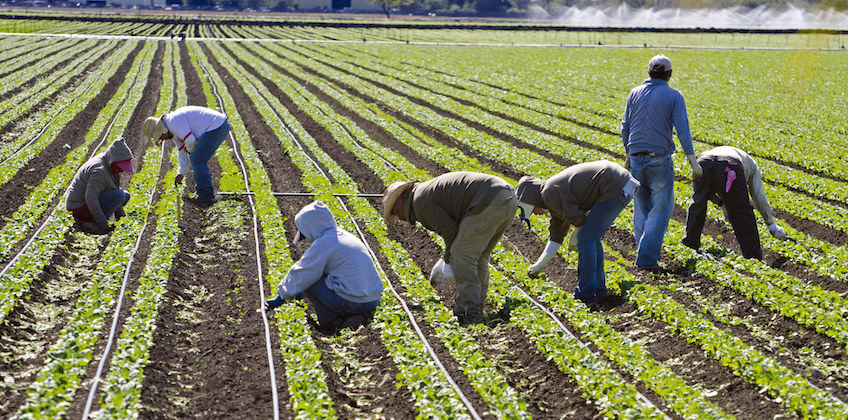The Value of the Undocumented Worker in California Can’t Be Overstated

By Gordon Gibb
Los Angeles, CA: The rhetoric against the undocumented worker has, for now been toned down in the wake of other issues taking more immediate precedence in the Trump White House, while support for the undocumented worker continues to roll through California and the positive impact undocumented immigrants have on the state economy.
Still, there are those who buy into President Donald Trump’s claim that immigrants are taking jobs away from US-born workers, and that undocumented workers have it easy.
Those conversant with the economy in the state of California, and how hard it often is to attract US-born residents to lower-paying jobs in the state, vehemently disagree with the naysayers who want all undocumented workers deported.
Ellen Brokaw runs a ranch in Ventura County. She told Pubic Radio International (PRI 03/06/17) that her dependence on immigrant labor to get in her crops – and the challenges she would face were undocumented labor to suddenly vanish – is mirrored across the agriculture sector of Ventura County. “There’s no way that we can take care of and pick our crops without immigrant labor,” she told PRI. Brokaw’s ranch – like others – encompasses hundreds of acres of trees that yield crops of avocados, oranges and lemons. Workers are required to climb ladders, pick the fruit by hand and transport the fruit in sacks, 80 pounds when completely full, on foot to collection bins.
Brokaw has tried to hire US-born workers, advertising widely according to rules built into a guest worker program. But Americans don’t seem to want the work. “It’s hard work, and it’s not very well-paid,” Brokaw told PRI. “Starting pay is $12 to $13 an hour. Sometimes some people apply but almost never, do any of them stay.”
Advocates of the undocumented worker cite this simple observation as the reason why the undocumented worker should be embraced, not abandoned: they accept lower-paying jobs most Americans don’t want, such as toiling in the fields, cleaning hotel rooms or serving as nannies.
Were the undocumented worker to suddenly disappear tomorrow, who would undertake those jobs? In Ventura County, for example as many as 36,000 field workers toil to bring in the citrus, avocado and strawberry crop at peak harvest season – and that’s in Ventura County alone. The Ventura County Farm Bureau told PRI that 95 percent of those workers are immigrants.
That snapshot is mirrored across the agriculture sector in the state. When all sectors are taken into context, said California state controller Betty Yee, immigrant labor is worth $180 billion alone to the state of California. While that figure is roughly ten percent of the entire gross domestic product of California – at $2.448 trillion the largest single economy of all the states in the US – it remains a vitally important aspect to the overall health and vitality of the state.
Critics suggest – and some studies have borne this out – that the prevalence of undocumented workers translates to downward pressure on wages for low-skilled workers. However, other economic studies do not support that conclusion and overall, reports PRI, economists generally agree that immigration as a whole benefits the US economy.
That’s especially true in California.
Beyond the value the undocumented worker has on the state economy, there remain signs that undocumented workers are often mistreated. Reports of unpaid wages, long hours, and poor working conditions continue to dot the legal landscape in spite of California’s progressive stance when it comes to fairness, and rights for the undocumented worker.
It’s the reason why an undocumented worker lawsuit can be of significant value not only for a plaintiff who has been treated unfairly, but also as an example to employers who are purveyors of unfairness and ill-treatment. The undocumented worker conversant with his or her value to the state economy – and the labor laws of the state – will not shy away from contacting an undocumented worker lawyer in order to pursue justice not only on his or her own behalf, but also in the interest of others.
One undocumented worker from South Korea who came into the US in 2014 on a student visa and overstayed, now works in a nightclub in Los Angeles and makes a very good wage in cash under the table – about $5,000 per month. And yet, at the same time the man is embroiled in a dispute with a former employer who underpaid him for years. The undocumented worker has been threatened with deportation – his former boss vows to report him to immigration – if he continues his pursuit of the wages which are his due.
“I’m undocumented, I don’t have papers. I don’t have a Social Security number, I don’t have a green card, so it becomes kind of natural for employers to take advantage of me,” the undocumented worker told PRI. “I just have to take it.”
But he doesn’t. An undocumented worker lawyer, conversant with employee rights in California and a state sensitive to the needs of its economy and sympathetic to the plight of the undocumented worker, can champion his case through an undocumented worker lawsuit.
Still, there are those who buy into President Donald Trump’s claim that immigrants are taking jobs away from US-born workers, and that undocumented workers have it easy.
Those conversant with the economy in the state of California, and how hard it often is to attract US-born residents to lower-paying jobs in the state, vehemently disagree with the naysayers who want all undocumented workers deported.
Ellen Brokaw runs a ranch in Ventura County. She told Pubic Radio International (PRI 03/06/17) that her dependence on immigrant labor to get in her crops – and the challenges she would face were undocumented labor to suddenly vanish – is mirrored across the agriculture sector of Ventura County. “There’s no way that we can take care of and pick our crops without immigrant labor,” she told PRI. Brokaw’s ranch – like others – encompasses hundreds of acres of trees that yield crops of avocados, oranges and lemons. Workers are required to climb ladders, pick the fruit by hand and transport the fruit in sacks, 80 pounds when completely full, on foot to collection bins.
Brokaw has tried to hire US-born workers, advertising widely according to rules built into a guest worker program. But Americans don’t seem to want the work. “It’s hard work, and it’s not very well-paid,” Brokaw told PRI. “Starting pay is $12 to $13 an hour. Sometimes some people apply but almost never, do any of them stay.”
Advocates of the undocumented worker cite this simple observation as the reason why the undocumented worker should be embraced, not abandoned: they accept lower-paying jobs most Americans don’t want, such as toiling in the fields, cleaning hotel rooms or serving as nannies.
Were the undocumented worker to suddenly disappear tomorrow, who would undertake those jobs? In Ventura County, for example as many as 36,000 field workers toil to bring in the citrus, avocado and strawberry crop at peak harvest season – and that’s in Ventura County alone. The Ventura County Farm Bureau told PRI that 95 percent of those workers are immigrants.
That snapshot is mirrored across the agriculture sector in the state. When all sectors are taken into context, said California state controller Betty Yee, immigrant labor is worth $180 billion alone to the state of California. While that figure is roughly ten percent of the entire gross domestic product of California – at $2.448 trillion the largest single economy of all the states in the US – it remains a vitally important aspect to the overall health and vitality of the state.
Critics suggest – and some studies have borne this out – that the prevalence of undocumented workers translates to downward pressure on wages for low-skilled workers. However, other economic studies do not support that conclusion and overall, reports PRI, economists generally agree that immigration as a whole benefits the US economy.
That’s especially true in California.
Beyond the value the undocumented worker has on the state economy, there remain signs that undocumented workers are often mistreated. Reports of unpaid wages, long hours, and poor working conditions continue to dot the legal landscape in spite of California’s progressive stance when it comes to fairness, and rights for the undocumented worker.
It’s the reason why an undocumented worker lawsuit can be of significant value not only for a plaintiff who has been treated unfairly, but also as an example to employers who are purveyors of unfairness and ill-treatment. The undocumented worker conversant with his or her value to the state economy – and the labor laws of the state – will not shy away from contacting an undocumented worker lawyer in order to pursue justice not only on his or her own behalf, but also in the interest of others.
One undocumented worker from South Korea who came into the US in 2014 on a student visa and overstayed, now works in a nightclub in Los Angeles and makes a very good wage in cash under the table – about $5,000 per month. And yet, at the same time the man is embroiled in a dispute with a former employer who underpaid him for years. The undocumented worker has been threatened with deportation – his former boss vows to report him to immigration – if he continues his pursuit of the wages which are his due.
“I’m undocumented, I don’t have papers. I don’t have a Social Security number, I don’t have a green card, so it becomes kind of natural for employers to take advantage of me,” the undocumented worker told PRI. “I just have to take it.”
But he doesn’t. An undocumented worker lawyer, conversant with employee rights in California and a state sensitive to the needs of its economy and sympathetic to the plight of the undocumented worker, can champion his case through an undocumented worker lawsuit.











No Comments